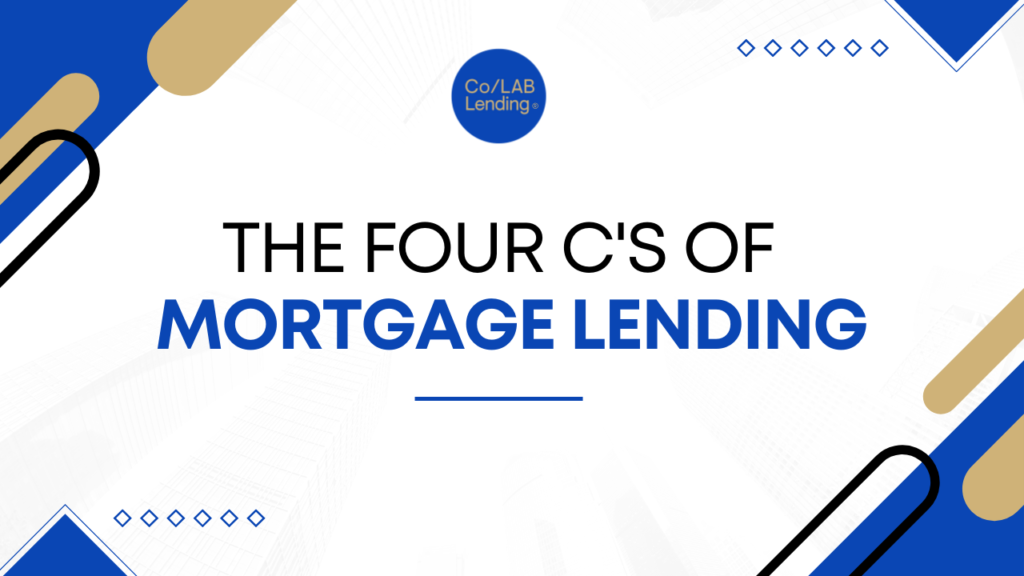Understanding Mortgage Loan Qualification
If you have ever bought a home or are thinking of buying a home you may have wondered how a lender decides if you are worthy of a mortgage loan qualification.
- Is it just your credit?
- Is it your income?
- Is it both?
Well, the truth is there are 4 qualities mortgage underwriters assess to help them decide if you are a good borrower or not. Every lender understands that each borrower carries a certain amount of risk. Some borrowers, obviously, are more risky than others. Because of this mortgage underwriters have developed a simple way to help them determine which loan applicants pose the most risk vs. those that pose the least risk.
Unraveling the Four C’s of Mortgage Lending
There are four primary considerations that affect your decision from the lenders perspective. These considerations are divided up into four qualities that are known in the lending industry as The Four C’s of Mortgage Loan Qualifying.
Let’s Talk about The Four C’s and help you better understand what they are and how they affect the possibility of your loan being approved or being declined.
Capacity
Capacity is the ability to pay back the loan. In other words it’s how much house you can afford. A monthly mortgage payment consists of the house payment, taxes, insurance and HOA fees if any are required.
Generally speaking your housing costs should be below 38% of your monthly income. Your Income is the amount of money you make from your current employment. However, underwriters will look at previous employment history as well. When you factor in your other debts like credit cards, school loans and car loans this is considered your debt-to-income ratio, or DTI. Depending on the loan type this should usually be below 43% but some loan types will require a lower DTI while others may allow higher. When the your DTI reaches or becomes larger than the maximum DTI allowed for a particular loan type, underwriters will see you as a higher level risk. However, exceptions are sometimes made depending on your scenario.
Before you apply for a loan we recommend you review your overall debts. If possible, pay down or even pay off any lines of credit you may have. However, do not close any accounts. Doing so could negatively affect your score. You may have to wait 30 days for any changes to reflect on your credit report, but doing so can help to reduce your DTI and increase your chances for getting a mortgage pre-qualification or approval.
Capital
Lenders want to be sure that in the event of unforeseen circumstances like temporary loss of employment that you, as a borrower, have enough money in the bank to pay for your mortgage. Typically, the more you have the better. Capital can include investments, properties and any other assets that you have available.
Underwriters want to know what you are worth. Determining this can help them feel more comfortable assessing the risk level of loaning you money. If lenders know that you can repay your debt it can only help improve your chances of you getting an approval and one step closer to a new home.
Collateral
If you fail to repay the loan, is there something of value that you agree to forfeit? Why, yes, there is – It’s the property you are taking the loan out on. Lenders look at the value of your property that you are using as security against the loan.. In other words, how does the value of your property compare to the loan amount. To find out appraisals are usually required before a lender commits to a loan. If for some reason you are unable to pay back the loan the lender wants to know that they can get their money back.
You might be more familiar with the process called foreclosure. If you cannot repay the loan the lender will foreclose on the home. This means that you give the house back to the lender in exchange for the remaining balance on the home. They can then resell the home and recoup any of the monies that were owed to them.
Credit
This is the “C” you are all familiar with and is usually the starting point for most home buyers when they begin considering the purchase of a new home. It is also the most important “C” in our opinion. Lenders will look at your current score, credit history, and if you made on-time payments. This tells them what kind of borrower you are and how well you pay your debts.
Credit factors include credit card payments, car payments, and student loans. As you already know the higher your credit score the more likely you are to get approved for a loan. Also be aware that higher scores get more favorable interest rates. This can save you thousands over the life of a loan.
Before you apply for a home mortgage you should review your credit report. Look for any incorrect information and any negative or derogatory comments from creditors. Even if you don’t think you have any negative information on your credit report it’s still smart to look just to be certain. Oftentimes, small amounts of interest can be left on an account that you thought was paid off or a debt that has been paid wasn’t updated by the creditor. Even the smallest debts that haven’t been paid or possibly forgotten about can have a huge affect on your credit score. Be sure to review the entire thing.
You can get a free copy of your credit report at annualcreditreport.com.
These are the Four C’s of Mortgage Qualifying. The stronger your capital, capacity, collateral and credit are the smoother your path to your dream home will be. So get started working on all of the “C’s” to make your odds of your lender giving you an approval for your next mortgage loan. Happy Saving!
